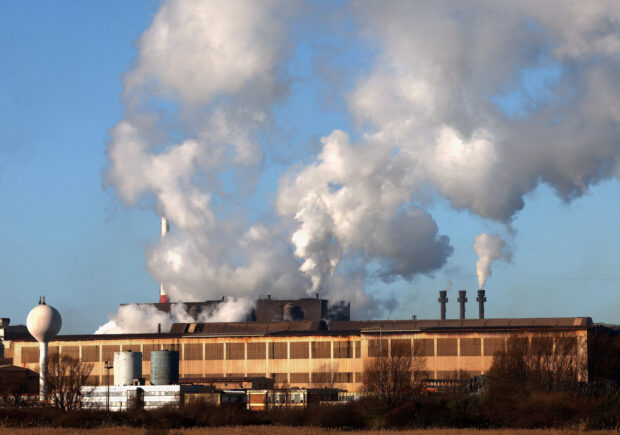
Smoke rises from chimneys at a factory in the port of Dunkirk, France January 19, 2023. (REUTERS/File Photo)
BEIJING – The United States and China, as the world’s two largest economies, must work together to combat the “existential threat” of climate change, U.S. Treasury Secretary Janet Yellen told Chinese government officials and climate experts on Saturday.
During a visit to Beijing, Yellen said previous cooperation on climate change between the U.S. and China had made possible global breakthroughs such as the 2015 Paris Agreement, adding that both governments wanted to support emerging markets and developing countries as they strive to meet their climate goals.
“Continued U.S.-China cooperation on climate finance is critical,” Yellen said in a prepared text at a climate roundtable in Beijing.
“As the world’s two largest emitters of greenhouse gases and the largest investors in renewable energy, we have both a joint responsibility – and ability – to lead the way.”
China, classified as a developing country by the United Nations, has long said it was the responsibility of developed nations to help poor countries pay to address climate change. But Beijing says it could contribute to “loss and damage” due to climate change on a voluntary basis.
Given their scale, cooperation between the U.S. and China is considered vital to international efforts to avert the worst impacts of climate change.
Yellen said financing for such initiatives should be coordinated efficiently and effectively, adding that Beijing’s support for existing multilateral climate institutions like the Green Climate Fund (GCF) and the Climate Investment Funds, alongside the Washington and others, could boost their impact.
China is welcome to join the United States in contributing to a round of fund pledging for the GCF in September, a U.S. Treasury official said. For that fund replenishment, President Joe Biden has said the U.S. would provide a further $1 billion.
CLIMATE ENVOY
The GCF is a fund under the United Nations Framework Convention on Climate Change (UNFCCC) that helps developing countries with adaptation and mitigation practices to tackle climate change.
Last year, China briefly suspended talks with the United States on climate, security and other areas in response to a visit to Taiwan by U.S. House of Representatives then-Speaker Nancy Pelosi.
Also speaking at the roundtable, U.S. Ambassador to China Nicholas Burns said he was looking forward to a visit by U.S. climate envoy John Kerry. Kerry has said China had invited him to visit soon.
Yellen also called back to the Summit for a New Global Financing Pact in Paris last month where she was pleased to join leaders from around the world, including Premier Li Qiang, according to a statement from the U.S. Treasury Department.
At the summit, Li had said China is ready to work with other countries to forge a global partnership for clean energy cooperation under the principles of mutual benefit and common but “differentiated” responsibilities.
FUNDING NEEDS
China is the largest market after Europe for climate funds, surpassing the U.S. as funds in China have more than doubled since 2021 to $46.7 billion, according to research firm Morningstar.
But the World Bank said last year China needs up to $17 trillion in additional investment for green infrastructure and technology in the power and transport sectors to reach its target of net-zero carbon emissions by 2060, underscoring the need for private investment.
“It is also critical that we encourage economy-wide transitions toward net-zero, which needs to include the private sector,” Yellen said.
Yellen said she looked forward to hearing recommendations from working groups at the upcoming Group of 20 finance ministers meetings in India, including the Sustainable Finance Working Group, which the United States and China co-chair.
“This is a good of example of what our bilateral cooperation can achieve – and we should build on it in multilateral forums,” she said.